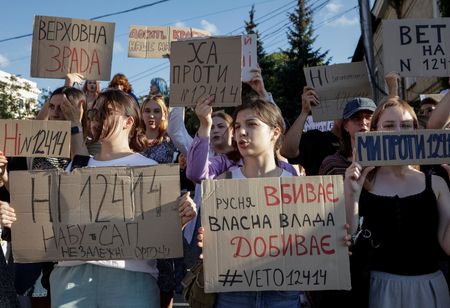By Ammu Kannampilly, Jennifer Rigby and Jonathan Landay
(Reuters) -U.S.-funded contraceptives worth nearly $10 million are being sent to France from Belgium to be incinerated, after Washington rejected offers from the United Nations and family planning organisations to buy or ship the supplies to poor nations, two sources told Reuters.
A spokesperson for the U.S. State Department confirmed to Reuters on Wednesday that a decision had been taken to destroy the stock.
The supplies have been stuck for months in a warehouse in Geel, a city in the Belgian province of Antwerp, following President Donald Trump’s decision to freeze U.S. foreign aid in January.
They comprise contraceptive implants and pills as well as intrauterine devices to help prevent unwanted pregnancies, according to seven sources and a screengrab shared by an eighth source confirming the planned destruction.
The U.S. government will spend $167,000 to incinerate the stocks at a facility in France that handles medical waste, the U.S. State Department confirmed.
The spokesperson said that a preliminary decision had been made to destroy certain products from terminated U.S. Agency for International Development contracts. “Only a limited number of commodities have been approved for disposal,” the spokesperson said via email, adding that no condoms or HIV medications would be destroyed.
U.S. lawmakers have introduced two bills this month to prevent the destruction of the supplies following Trump’s decision to shut down USAID, but aid groups say the bills are unlikely to be passed in time to stop the incineration.
The Belgian foreign ministry said Brussels had held talks with U.S. authorities and “explored all possible options to prevent the destruction, including temporary relocation.”
“Despite these efforts, and with full respect for our partners, no viable alternative could be secured. Nevertheless, Belgium continues to actively seek solutions to avoid this regrettable outcome,” it said in a statement shared with Reuters on Tuesday.
“Sexual and reproductive health must not be subject to ideological constraints,” it added.
The supplies, worth $9.7 million, are due to expire between April 2027 and September 2031, according to an internal document listing the warehouse stocks and verified by three sources.
Sarah Shaw, Associate Director of Advocacy at MSI Reproductive Choices, told Reuters the non-profit organisation had volunteered to pay for the supplies to be repackaged without USAID branding and shipped to countries in need, but the offer was declined by the U.S. government.
“MSI offered to pay for repackaging, shipping and import duties but they were not open to that… We were told that the U.S. government would only sell the supplies at the full market value,” said Shaw.
She did not elaborate on how much the NGO was prepared to pay, but said she felt the rejection was based on the Trump’s administration’s more restrictive stance on abortion and family planning.
“This is clearly not about saving money. It feels more like an ideological assault on reproductive rights, and one that is already harming women.”
She added that many countries in sub-Saharan Africa had relied on USAID for access to contraception and that the aid cuts would lead to a rise in unsafe abortions.
The United Nations’ sexual and reproductive health agency, UNFPA, also offered to buy the contraceptives outright, three sources told Reuters, without disclosing the financial terms of the proposal.
‘DOZENS OF TRUCKLOADS’
However, negotiations broke down, a source with knowledge of the talks said, in part due to a lack of response from the U.S. government. UNFPA declined to comment.
One of the sources with knowledge of the issue said that the Trump administration was acting in accordance with the Mexico City policy, an anti-abortion pact in which Trump reinstated U.S. participation in January. The pact forbids the U.S. government from contributing to or working with organisations providing funding or supplies that offer access to abortions.
The source said there was no way for the U.S. government to ensure that UNFPA would not share the contraceptives with groups offering abortions, violating the Mexico City policy. The State Department also told Reuters these were factors in their decision on Wednesday, and added that it had avoided $34.1 million in costs by cancelling other orders placed under the Biden administration.
The source also said the matter was complicated by the fact that the contraceptives in Belgium were embossed with the USAID trademark and Washington did not want any USAID-branded supplies to be rerouted elsewhere.
UNFPA did not immediately respond to requests for comment on the concerns raised by the source.
One of the two sources who told Reuters the stocks of contraceptives were being trucked to France said it would likely take dozens of truckloads and at least two weeks to move the supplies out of the Geel warehouse, with a third source also confirming the scale of the operation. The French government did not immediately respond to requests for comment.
Chemonics, the contractor managing the supply chain for USAID’s family planning programme, declined to comment on the plans to destroy the supplies.
(Reporting by Ammu Kannampilly in Nairobi, Jennifer Rigby in London, and Jonathan Landay in Washington; additional reporting by Charlotte Van Campenhout in Brussels; Editing by Alexandra Hudson and Rosalba O’Brien)











